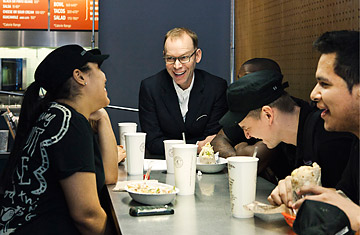
Steve Ells in New York City with Chipotle employees, who are hired based on 13 characteristics, four of which basically mean happy.
(5 of 6)
One of the challenges is that most of the fast-food chains that Americans like serve food that, for health and ecological reasons, Ells doesn't feel good about people eating every day--burgers, fried chicken, pizza. Ells, however, has always loved Asian food, which he thought could work under the Chipotle system of giving customers a few choices to construct their own dishes. So he toured a bunch of Asian countries, took a lot of notes and went to Washington to open his first ShopHouse, which is named after places in which families live above their restaurants. The restaurant sells vaguely Vietnamese food; its customers choose from four ingredients (pork-and-chicken meatballs, chicken satay, chili-rubbed steak or tofu) and add toppings such as eggplant, papaya slaw, peanuts and curry. Everything is put over noodles or rice, and the result is surprisingly good--especially the pork-and-chicken meatballs--with bolder flavors and far better vegetables than Chipotle offers. Almost none of ShopHouse's customers have any idea that the place is owned by the same company that owns the Chipotle across the street (and is run by the same restaurateur, who emits a Prozac-ian level of happy).
ShopHouse, which is getting ready to open a second location in D.C. this year, looks weathered and casual, but it's meticulously designed. "Steve sweats very, very minor details," says Moran. And when Ells finds something he declares perfect--like a set of wineglasses he recently bought for himself--he insists that everyone he knows get them too. Right now Ells and his longtime boyfriend, who is a doctor, are moving a few blocks away in Manhattan. He's moving offices too, because the company needs more space, and he's very involved in the details. Just like at the restaurants. "A lot of people can be exhausted by his focus on the minor details, like how the lightbulbs screw into the socket, how the bathroom-door hinges close," says Moran. "He's a guy who's always on high alert. When you're around him, it always feels like everything is a bit of an emergency."
When I ask Ells about the ongoing criminal investigation into the chain's alleged hiring of undocumented immigrants and into its disclosures about the federal probe, he indicates his frustration with conflicting government rules that say you have to make sure employees have their papers but you can't be overzealous about asking for them. "We followed the letter of the law," he says. "It makes it tough to do business in this country when the rules aren't clear."
Another thing that made Ells not happy was being on America's Next Great Restaurant, a reality show that had contestants vying to launch a new chain restaurant; the winning concept, a soul-food chain, failed immediately. Ells says he agreed to be one of the judges, at Crumpacker's urging, only because he thought it would give him a platform to talk about sustainability. "I had not seen a reality show before that. I didn't know the format. I was a little naive," Ells says. (Neither fellow judge Bobby Flay nor anyone else involved with the show wanted to talk to me about the experience with Ells, and that was before Chipotle sank $2.3 million into the short-lived Soul Daddy chain.)
